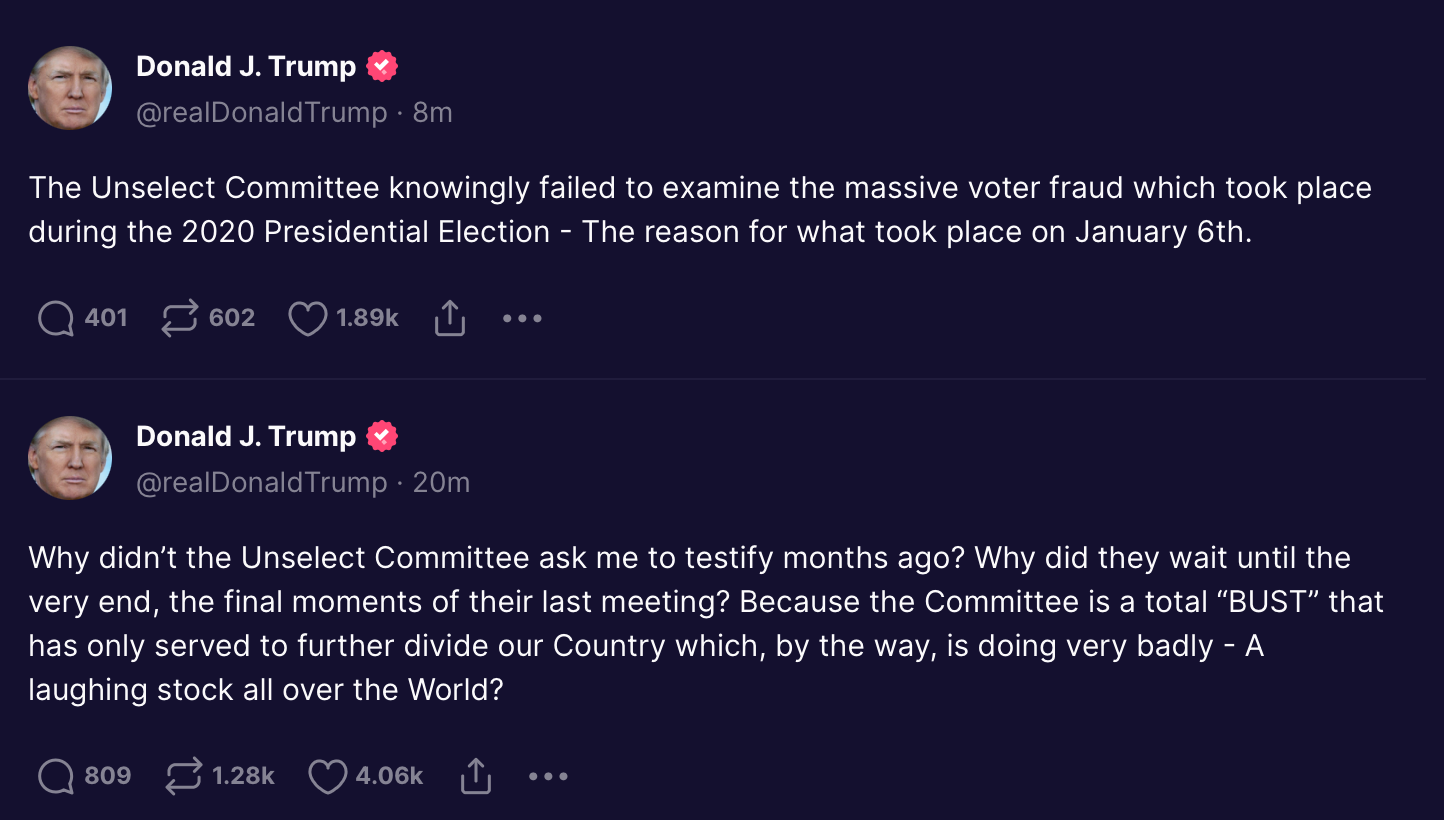The House committee investigating the Jan. 6, 2021, riot at the U.S. Capitol voted to subpoena former President Donald Trump on Thursday, but convincing him to speak under oath could be their toughest task yet.
Following the ninth and likely the last hearing on Trump’s efforts to overturn the 2020 election, the nine-member committee voted 9-0 to issue a subpoena to the former president after summarizing the events of the Jan. 6 attack in a bid to convince the nation that the riot was premeditated by Trump himself. The Republican vice chairwoman of the committee, Rep. Liz Cheney (WY), said, “We are obligated to seek answers directly from the man who set this all in motion.”
Cheney also indicated that the committee “may ultimately decide to make a series of criminal referrals to the Justice Department,” though she contended that she and other members “recognize that our role is not to make decisions regarding prosecution.”
JAN. 6 SELECT COMMITTEE UNANIMOUSLY VOTES TO SUBPOENA TRUMP

After the subpoena vote, Trump called the committee’s review “a total ‘BUST'” that only serves “to further divide our Country.”
“The Unselect Committee knowingly failed to examine the massive voter fraud which took place during the 2020 Presidential Election — The reason for what took place on January 6th,” Trump posted on Truth Social.
But despite his vehement grievances with the committee, Trump could use the subpoena as an opportunity, according to a source familiar with the matter.
Trump “loves the idea of testifying” and could “talk about how corrupt the election was, how corrupt the committee was, and how Nancy Pelosi did not call up the National Guard that Trump strongly recommended for her to do three days earlier on January 3, 2021,” the source told Fox News Thursday evening, underscoring that it is unclear whether Trump actually plans to testify.
Alternatively, Trump could decide not to testify and fight the subpoena, as the select panel’s request coincides with their own dwindling timetables to interview him before the current session of Congress concludes next year. Republicans are hoping to retake the House and could dismantle the committee.
The former president has delayed the committee’s information-seeking efforts in the past in litigation that sought to block lawmakers from obtaining White House records, though the Supreme Court ultimately allowed the committee access to the former administration’s records in January.
When a target of a subpoena chooses defiance, there is typically a vote of contempt of Congress, followed by a referral to the DOJ, at which point the agency determines whether to press criminal charges.
Several of Trump’s allies have defied subpoenas related to the Jan. 6 investigation, including his former aide Steve Bannon, who was found guilty of contempt of Congress earlier this year. Bannon failed in his argument, which cited that Trump’s assertion of executive privilege superseded the legal sway of a congressional subpoena.
But the DOJ has not always followed lawmakers’ suggestions when it comes to recommended charges, like when the agency declined to prosecute Trump’s former chief of staff Mark Meadows and Social Media Director Dan Scavino for refusing to cooperate with the committee in June. The pair engaged in monthslong negotiations with the committee, with Meadows offering thousands of text messages related to their Jan. 6 probe, though lawmakers ultimately pursued charges after both of them decided against testifying.
GEORGE CONWAY PREDICTS TRUMP WON’T COOPERATE WITH JAN. 6 SUBPOENA
Following the committee’s hearing, George Conway, the conservative lawyer and husband of former White House counselor Kellyanne Conway, expressed doubts that Trump would comply with the Jan. 6 committee’s subpoena.
“He won’t do it, and they highlighted the fact he won’t do it by noting the fact that so many around him took the Fifth Amendment or otherwise avoided testimony, and that’s what he’s going to do here obviously, but it really puts it to him. And why can’t he answer? Why can’t he answer directly? Why can’t he answer under oath? And he won’t, and that’s the gauntlet they threw,” Conway said Thursday.

